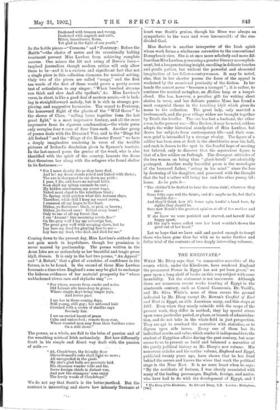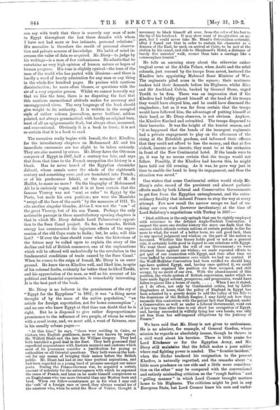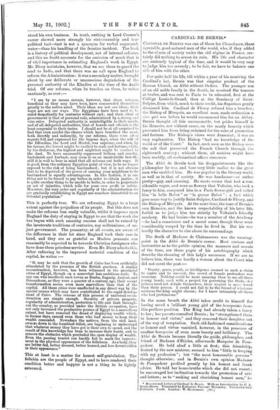THE KHEDIVATE.*
WHEN Mr. Dicey says that "a consecutive narrative of the events which, under the Khedivate, have rendered England the permanent Power in Egypt has not yet been given," we gaze upon a long shelf of books on this very subject with some incredulity. Yet the statement is not inaccurate. Although there are numerous recent works treating of Egypt in the nineteenth century, such as Consul Cameron's, Dr. Train's, and Mr. Silva White's, none of them covers the ground indicated by Mr. Dicey except Dr. Bowen's Conflict of East and West in. Egypt, an able American essay, and this stops at 1887. Even when they nearly coincide with the scope of the present work, they differ in method; they lay special stress upon some particular period, or phase, or branch of administra, tion, and do not take in the whole field in just perspective. They are apt to overload the narrative with statistics, or to digress upon side issues. Every one of them has its individual merits and value, which render it indispensable to the student of Egyptian affairs during the past century, but none seems to us to present as lucid and balanced a narrative of the purely political history as Mr. Dicey's new volume. His numerous articles and his earlier volume,. England and Egypt, published twenty years ago, have shown that he has lived behind the scenes and knows the wires that work the political stage in the Near East. It is no mere boast when he says : "By the accidents of fortune, I was closely associated with many of the leading personages, English, foreign, and native, who have had to do with the development of Egypt, and l • The Story of the Shedivate. By Edward Dicey, [1650
C.E. London: Eivingtons.
can say with truth that there is scarcely any man of note in Egypt throughout the last three decades with whom I have not bad more or less intimate, personal relations." His narrative is therefore the result of personal observa- tion and private sources of knowledge. His habit of mind in- creases the value of data so acquired. Mr. Dicey—to judge by his writings—is a man of few enthusiasms. He admits that he entertains no very high opinion of human nature or hopes of human progress. His tone is slightly cynical—the tone of the man of the world who has parted with illusions—and there is hardly a word of hearty admiration for any man or any thing in the whole five hundred pages. He praises with cautious discrimination; he more often blames, or questions with the air of a very superior person. Whilst we cannot honestly say that we like the tone, there is no disputing the fact that this cautious unemotional attitude makes for accuracy and unexaggerated views. The very language of the book should give weight to its authority. It is written in the accepted style of rather solemn journalism, never brilliant, seldom pointed, not always grammatical, with hardly an original turn, least of all an epigrammatic flash, but always clear, measured, and conventional. Obviously it is a book to trust; it is not so certain that it is a book to read.
The narrative really begins with Ismail, the first Khedive, for the introductory chapters on Mohammed Ali and his immediate successors are too slight to be taken seriously.
They are also marred by errors. Mr. Dicey dates the Ottoman conquest of Egypt in 1567, half a century too late, and says that from that time to the French occupation the history is a blank. Has he never heard of the Egyptian chronicler Jabarti, whose annals cover the whole of the eighteenth century and something over, and are translated into French ; or of his predecessor Ishaki, or the memoirs of M. de Maillet, to name no more ? On the biography of Mohammed Ali he is curiously vague, and it is at least certain that the famous Viceroy was not " sent as ruler" to Egypt by the Porte, but made his own position ; nor were the Mamluks "swept off the face of the earth" by the massacre of 1811. To cite another singular blunder, Abbas I. was not the " son " of the great Viceroy, but of his son Tusun. Perhaps the only noticeable passage in these unsatisfactory opening chapters is that in which Mr. Dicey defends Lord Palmerston's opposi- tion to the Suez Canal project. So far, he remarks, British energy has counteracted the injurious effects of the super- session of the old Cape route to India ; but, he asks, will this last ? " If ever the time should come when the historians of the future may be called upon to explain the story of the decline and fall of British commerce, one of the explanations which will be offered will undoubtedly be the revolution in the fundamental conditions of trade caused by the Suez Canal." When he comes to the reign of Ismail, Mr. Dicey is on surer ground. He knew the ex-Khedive well, and liked him, in spite of his colossal faults, evidently far better than he liked Tewfik, and his appreciation of the man, as well as his account of his political and financial experiments, is remarkably interesting.
It is the best part of the book.
Mr. Dicey is no believer in the genuineness of the cry of "Egypt for the Egyptians" in 1882; it was "a thing never thought of by the mass of the native population," " an article for foreign exportation, not for home consumption " ; and no one who knew Egypt at that time can doubt that he is right. But he is disposed to give rather disproportionate prominence to the influence of two people, of whom he writes with a cruel irony, and, we must add, a want of fairness, rare in his usually urbane pages
At this time," he says, " there were residing in Cairo, as visitors, two English gentlemen, more or lass known by repute, Mr. Wilfrid Blunt and the late Sir William Gregory. They had both travelled a good deal in the East. They both possessed that superficial acquaintance with Eastern manners and customs which most of its possessors consider a justification for posing as authorities on all Oriental questions. They both were on the look- out for any means of bringing their names before the British public. Mr. Blunt had had at one time poetical aspirations, and had. been regarded as a young bard of promise amongst our minor poets. During the Franco-German war, he acquired a certain amount of notoriety for the extravagance with which he espoused the cause of France, and later on he made himself conspicuous as an Englishman who was more Oriental than any Moslem born and bred. When our fellow-countrymen go in for what I may call the cult' of a foreign race or creed, they always remind me of the amateur who, when he acted the Moor of Venice, thought it necessary to black himself all over, from the sobs of his feet to the tip of his forehead. It may show want of imagination on my part, but I could never take Mr. Blunt's Orientalism seriously, after I found out that in order to sustain his character as a denizen of the East, he used, on arrival at Cairo, to be met at the station by his camel, and ride to Shepheard's Hotel, a distance of barely five minutes' walk, sooner than take a carriage like a commonplace tourist."
He tells an amusing story about the otherwise rather tragical scene at the Abdin Palace, when Arabi and the rebel colonels, just rescued by the troops from arrest, hectored the Khedive into appointing Mahmud Sarni Minister of War.
The regiments piled arms in the square ; their mutinous leaders laid their demands before his Highness, whilst Riaz and Sir Auckland Colvin, backed by General Stone, urged Tewfik to be firm. There was an impression that if the Khedive had boldly placed himself at the head of -his troops they would have obeyed him, and he could have disarmed the ringleaders ; but as it was far from certain that the troops would have followed him, the advantage of putting himself at their head, as Mr. Dicey observes, is not obvious. Anyhow, the Khedive flinched and submitted. The troops dispersed to their barracks. It was the height of the tourist season, and "it so happened that the bands of the insurgent regiments had a private engagement to play on the afternoon of the rising at the Ezbekieh gardens, and informed their officers that they could not afford to lose the money, and that at five o'clock, emeute or no emeute, they must be at the orchestra in front of the New Continental hotel. If the bands were to go, it was by no means certain that the troops would not follow. Possibly, if the Khedive had known this, he might have held out till evening. As it was, he gave way just in time to enable the band to keep its engagement, and thus the situation was saved."
One wishes that some Continental critics would study Mr. Dicey's calm record of the persistent and almost pathetic efforts made by both Liberal and Conservative Governments to get free from the Egyptian entanglement, and the extra- ordinary fatality that induced France to stop the way at every attempt. Few now recall the narrow escape we had of un- doing our own work (however involuntary) at the time of Lord Salisbury's negotiations with Turkey in 1887 :—
" Died stillborn is the only epitaph that can be rightly employed with reference to the defunct Anglo-Turkish Convention. I suspect the more one studies history the more one finds that the success which attends certain nations at certain periods is due far more to what, for want of a better term, we call good luck, than to any special judgment and wisdom on the part of the nation so favoured. Whether this theory holds good or not as a general rule, it certainly holds good in regard to our relations with Egypt. We went there against the will of our Government ; we were detained there against our wishes ; we made repeated efforts to get quit of our connection with Egypt, and time after time we were baffled by circumstances over which we had no control. If the Wolff-Mukhtar Convention had been ratified we should long ago have quitted Egypt, and, having once quitted it, we could never have regained the position we then occupied, and still occupy, by no merit of our own. With the abandonment of this position, the whole system of British supervision, under which we have made Egypt solvent, prosperous, and progressive, would have fallen to pieces like a house of cards When I see it stated, as I do often, not only by Continental critics, but by Little Englanders at home, that the policy of England in Egypt has been actuated by a greedy desire to add the valley of the Nile to the dominions of the British Empire, I may fairly ask how they reconcile this contention with the patent fact that England, under a Conservative as well as under a Liberal Government, went out of her way time after time to cut short her occupation of Egypt, and, having succeeded in wilfully tying her own hands, was only set free from her self-imposed obligations by the jealousy of France."
We have said that Mr. Dicey is not given to enthusiasm. He is no admirer, for example, of General Gordon, whose mission he regards as absolutely insane, though he throws in a civil word about his heroism. There is little praise for Lord Kitchener or for the Egyptian Army, and Mr. Dicey still maintains that the fellah makes a poor soldier where real fighting power is needed. The " frontier incident," when the Sirdar tendered his resignation to the present Khedive, is naturally regretted, and the remarks about "a little more prudence on one side and a little more considera- tion on the other" may be compared with the conventional and entirely misleading criticism on the "rough fashion" and "galling manner" in which Lord Cromer brought matters home to his Highness. The criticism might be just in any European State, but Lord Cromer knew his men and under- stood his own business. In truth, nothing in Lord Cromer's career showed more strongly his statesmanship and true political tact—tact is not a synonym for verbal sugar-and- water—than his handling of the frontier incident. The book is a history of political development, not of internal reforms. and this no doubt accounts for the omission of much that is of vital importance in estimating England's work in Egypt. Mr. Dicey maintains, however, that we are there to guard the road to India, and that there was no call upon England to reform the Administration: it was a secondary matter, brought about by our deliberate or unconscious degradation of the personal authority of the Khedive at the time of the Arabi trial. Of our reforms, when he touches on them, he writes cautiously, as ever :-
"I am by no means certain, however, that these reforms, beneficial as they may have been, have commended themselves greatly to the native mind. Their ideas are not our ideas ; their ways are not our ways. The Egyptians have been used to be ruled despotically for centuries without end; and their ideal of government is that of personal rule, administered by a strong and wise ruler. Delegated authority is unintelligible to their minds, and of all delegated authorities, that of boards and officials is the least congenial to their tastes. I should not be at all surprised to find that even amidst the classes which have benefited the most, both directly and indirectly, by our reforms, there were often regrets felt and expressed for the bygone days, when the will of the Effendina, the Lord and Master, was supreme, and when, by his favour, the lowest might be exalted to rank and fortune, while, by his disfavour, the highest and mightiest might be crushed to the dust. To have measurably suppressed bribery and cruelty, backsheish and kurbash, may seem to us an incalculable benefit ; still it is well to bear in mind that all reforms cut both ways. It is good, from the ordinary Egyptian point of view, to be no longer exposed to the risk of being bastinadoed ; but it is not obvious that to be deprived of the power of causing your neighbour to be bastinadoed is equally advantageous. In like fashion, it is one thing not to be forced to pay bribes in order to obtain justice ; it is quite another thing to be unable to bribe, in order to perpetrate an act of injustice, which tells for your own profit or safety. Moreover, the very order and regularity of the administration we are gradually establishing in Egypt are somehow distasteful to an Oriental population."
This is perfectly true. We are reforming Egypt to a large extent against the prejudices of its people. But this does not make the reforms less really valuable, whilst it imposes upon England the duty of staying in Egypt to see that the work she has begun with such amazing success shall not be ruined by the inveterate traditions of centuries, nay millenniums, of un- just government. The peasantry, at all events, are aware of the difference in their lot since England took their case in hand, and they are as grateful as Moslem peasants can reasonably be expected to be towards Christian foreigners who have done them priceless service. Even Mr. Dicey admits this. After referring to the improved material condition of the capital, he writes :—
"It may be said that the growth of Cairo has been artificially stimulated by the presence of the British garrison. A similar reconstruction, however, has been witnessed in the provincial cities of Egypt, though on a somewhat less ambitious scale. To any one who recollects such towns as Benha, Zagazig, Assiout, and Damanhour, as they were a quarter of a century ago, their recent transformation seems even more marvellous than that of the capital. All these cities were unaffected in any direct way by the special causes which may have contributed to the rapid develop- ' ment of Cairo. The reasons of this process of universal recon- struction are simple enough. Security of private property, regularity of administration, protection to life and limb through- out the country, as provided under the British occupation, have not only increased the productive powers of Egypt to a marvellous extent, but have removed the dread of displaying wealth which, III former days, caused even those who had money to keep their wealth concealed. Nowadays the natives, from the rich land- owners down to the humblest fellah, are beginning to understand that whatever money they have got is their own to spend, and the result of this knowledge has been to increase their wants, and to remove the obstacles which precluded the open display of wealth. Even the passing tourist can hardly fail to mark the improve- ment in the physical appearance of the fellaheen. As a body, they are better fed, better dressed, better housed, and less downtrodden in their appearance."
This at least is a matter for honest self-gratulation. The fellahin are the people of Egypt, and to have rendered their condition better and happier is not a thing to be lightly esteemed.












































 Previous page
Previous page